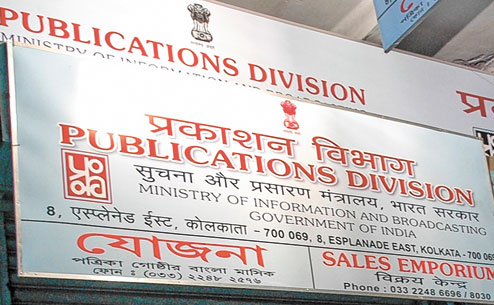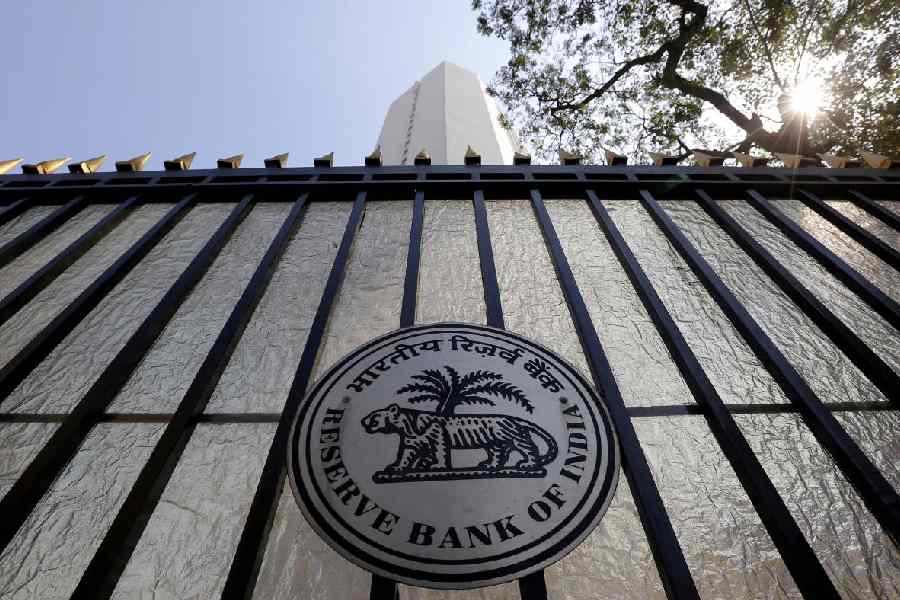We Indians love to pontificate. We love to be long-winding. And perhaps we love even more to bore the hell out of people. This becomes clear when one steps into the vast, dusty “sales emporium” of the publishing division of the ministry of information and broadcasting of the government of India at 8 Esplanade East adjacent to the Esplanade post office, once the famed Morrison and Cottle building. It is impossible for passersby to realise that this is a bookshop for there is hardly any trace of books in the dirty shop window. Books are on display, but books grimy with dirt and dust, and above all neglect, stacked — rather stashed — on gritty shelves.
Instead of a bookshop, it actually resembles any other government office, at which nobody takes a second look. Little wonder people who pass by every day miss it.
 |
| The sales emporium of the ministry of information and broadcasting’s publishing division. Picture by Bishwarup Dutta |
There are books in Hindi, English, Bengali and even Urdu on a wide range of subjects from the freedom struggle, Ustad Allauddin Khan, Begum Hazrat Mahal and winners of the Dadasaheb Phalke award to Ramayan for children and “inspiring historical stories” for children as well.
Inside there are endless rows of shelves laden with such irresistible titles such as the speeches of Jawaharlal Nehru, Indira Gandhi, Radhakrishnan, K.R. Narayan, V.P. Singh, Narasimha Rao. If one does not find this exciting enough, what about an entire series on the states of India, the Press in India, and the great and good of the country? These books are all published in Delhi, so one can imagine the quality of Bengali. Yet there is a book on Ramananda Chattopadhyay and other luminaries. Who decides the titles? Who chooses the writers?
Even the illustrated books on Indian miniatures with several pictures look uninviting as the packaging, printing and binding are poor. There are several titles for children as well. Their contents may not be that bad — folk tales from all over the country, among others — but the illustrations are amateurish.
Two staff members are visible, and since nobody ever enters the bookshop they do little else but twiddle their thumbs. Think of the great waste of funds and resources. A placard hung a couple of days ago declares that a “Summer book exhibition” is on from June 11 to 22. Book lovers can avail themselves of a 10 per cent discount, but where have all the book lovers gone? Do they know that this bookshop exists at all?
Spivak speaks
It was a surprise to find post-modern, deconstruction theorist Gayatri Chakravorty Spivak give a special lecture on the occasion of the 175th birth anniversary celebration of Sri Ramakrishna. But the choice seemed natural once it was known that the Columbia University professor shared a very intimate relation with the Ramakrishna Mission. Both her parents had been initiated (given diksha) into this order, her father by Sri Ma Sarada Devi herself and her mother by Swami Sivananda.
 |
| Gayatri Chakravorty Spivak |
Swami Tyagarupananda had helped the professor devise the title of the lecture: “Sri Ramakrishna: a sacred life.”
“We substituted ‘sacred’ for ‘divine’ because I am not, strictly speaking, a believing person. Sri Ramakrishna’s self description was that he lived within an unbroken intuition of the transcendental. As I think I write this for the first time in my life of 70 years, I realise that I have no interest at all in bringing this into the ambit of understanding or analysis. This dwelling in an unbroken intuition of the transcendental was part of something into which we were inserted as infants. Thakur proshner ateet (Sri Ramakrishna is beyond questioning). This is the closest formulation I can make of a wordless precomprehension that I have never attempted to describe.”
As a young academic in New York, she had confided to Swami Pabitrananda at the New York Vedanta Society. “I told him I did not enjoy being the receiver of a certain degree of devotion there in New York because my great grandfather Pratap Chandra Majumdar had been Sri Ramakrishna’s doctor. Because my father Paresh Chandra Chakrabarti was initiated by Sri Sarada Devi and because my mother Sibani Chakrabarti was initiated by Swami Sivananda. So people kind of put me on a pedestal and I, 20 years old, told the maharaj I was not enjoying this, this commodification of my family history. He said nothing.” Later, the young academic told the swami she had lost her faith. To this he did respond. He said: Kothaye jabe? Tomar adhayan i tomar tapasya. (“Your studies are your penance”).
Green start
Two babies, born a couple of days before World Environment Day on June 8, had a green start thanks to an innovative scheme of the Calcutta Municipal Corporation.
 |
| Children participate in a walk on World Environment Day |
The parents of Alekhyo Bhadra and a girl child who is yet to be named planted saplings under the corporation’s “Have a newborn; plant a sapling” project, one Bakul and the other Mahogany, at the Agri-Horticulture Society Garden on World Environment Day. The parents will look after the saplings they planted.
Mayor-in-council (parks and gardens) Debasish Kumar said the programme has been launched to foster green awareness. “Calcutta has far less greenery than it should have. We are launching the programme to forge a bond between the young generation and plants,” he said.
(Contributed by Soumitra Das, Anasuya Basu and Jayanta Basu)










